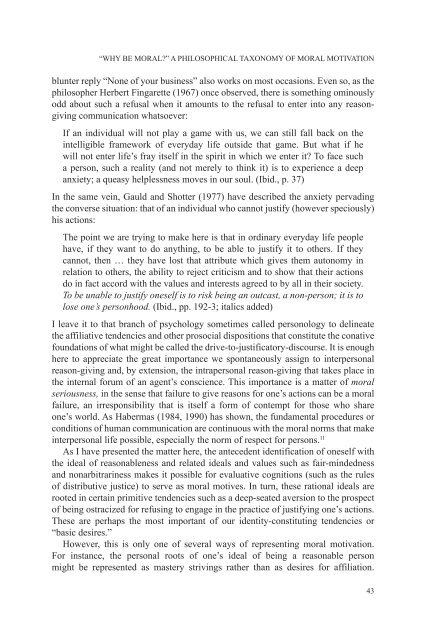Handbook of moral motivation: Theories, models ... - Sense Publishers
Handbook of moral motivation: Theories, models ... - Sense Publishers
Handbook of moral motivation: Theories, models ... - Sense Publishers
- No tags were found...
You also want an ePaper? Increase the reach of your titles
YUMPU automatically turns print PDFs into web optimized ePapers that Google loves.
“WHY BE MORAL?” A PHILOSOPHICAL TAXONOMY OF MORAL MOTIVATIONblunter reply “None <strong>of</strong> your business” also works on most occasions. Even so, as thephilosopher Herbert Fingarette (1967) once observed, there is something ominouslyodd about such a refusal when it amounts to the refusal to enter into any reasongivingcommunication whatsoever:If an individual will not play a game with us, we can still fall back on theintelligible framework <strong>of</strong> everyday life outside that game. But what if hewill not enter life’s fray itself in the spirit in which we enter it? To face sucha person, such a reality (and not merely to think it) is to experience a deepanxiety; a queasy helplessness moves in our soul. (Ibid., p. 37)In the same vein, Gauld and Shotter (1977) have described the anxiety pervadingthe converse situation: that <strong>of</strong> an individual who cannot justify (however speciously)his actions:The point we are trying to make here is that in ordinary everyday life peoplehave, if they want to do anything, to be able to justify it to others. If theycannot, then … they have lost that attribute which gives them autonomy inrelation to others, the ability to reject criticism and to show that their actionsdo in fact accord with the values and interests agreed to by all in their society.To be unable to justify oneself is to risk being an outcast, a non-person; it is tolose one’s personhood. (Ibid., pp. 192-3; italics added)I leave it to that branch <strong>of</strong> psychology sometimes called personology to delineatethe affiliative tendencies and other prosocial dispositions that constitute the conativefoundations <strong>of</strong> what might be called the drive-to-justificatory-discourse. It is enoughhere to appreciate the great importance we spontaneously assign to interpersonalreason-giving and, by extension, the intrapersonal reason-giving that takes place inthe internal forum <strong>of</strong> an agent’s conscience . This importance is a matter <strong>of</strong> <strong>moral</strong>seriousness, in the sense that failure to give reasons for one’s actions can be a <strong>moral</strong>failure, an irresponsibility that is itself a form <strong>of</strong> contempt for those who shareone’s world. As Habermas (1984, 1990) has shown, the fundamental procedures orconditions <strong>of</strong> human communication are continuous with the <strong>moral</strong> norms that makeinterpersonal life possible, especially the norm <strong>of</strong> respect for persons. 11As I have presented the matter here, the antecedent identification <strong>of</strong> oneself withthe ideal <strong>of</strong> reasonableness and related ideals and values such as fair-mindednessand nonarbitrariness makes it possible for evaluative cognitions (such as the rules<strong>of</strong> distributive justice) to serve as <strong>moral</strong> motive s. In turn, these rational ideals arerooted in certain primitive tendencies such as a deep-seated aversion to the prospect<strong>of</strong> being ostracized for refusing to engage in the practice <strong>of</strong> justifying one’s actions.These are perhaps the most important <strong>of</strong> our identity -constituting tendencies or“basic desires .”However, this is only one <strong>of</strong> several ways <strong>of</strong> representing <strong>moral</strong> <strong>motivation</strong> .For instance, the personal roots <strong>of</strong> one’s ideal <strong>of</strong> being a reasonable personmight be represented as mastery strivings rather than as desires for affiliation.43














